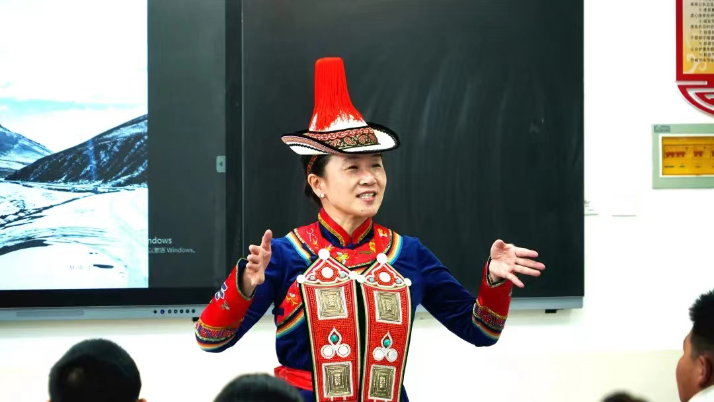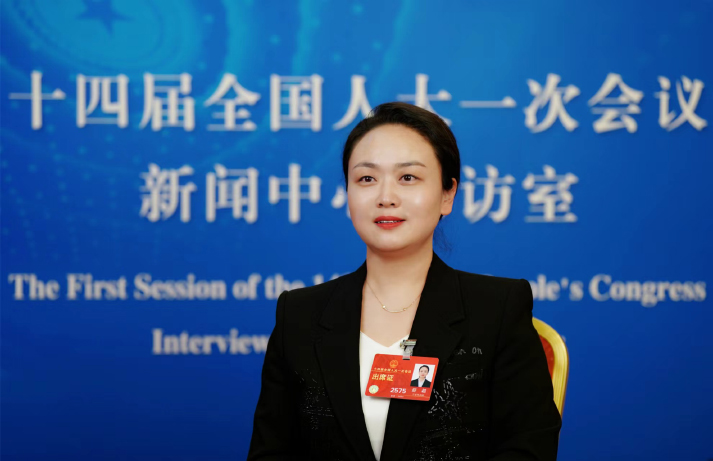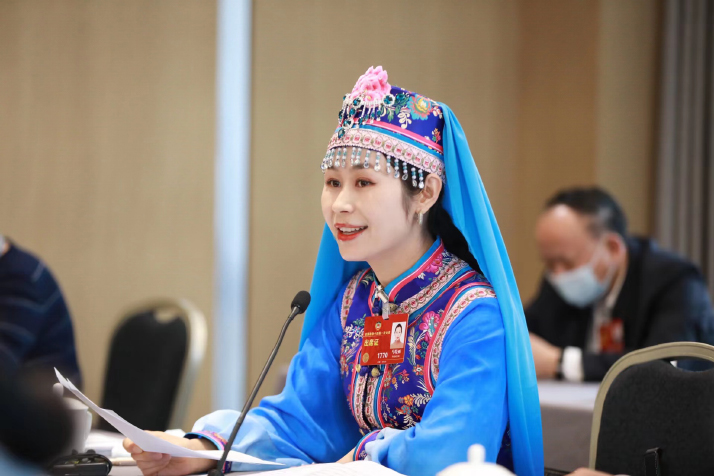| China |
| Ethnic minority lawmakers and political advisers offer development suggestions | |
|
|
 He Yingchun
International Women's Day comes on March 8 every year when China's Two Sessions, the country's major annual political meetings, are usually in full swing. The term Two Sessions refers to the gatherings of the National People's Congress (NPC), China's top legislature, and the Chinese People's Political Consultative Conference (CPPCC) National Committee, the country's top political advisory body. Female NPC deputies and CPPCC National Committee members spend the day of celebration attending the sessions in Beijing, which ran from March 4 to 13 this year. The 14th NPC has 790 female deputies, accounting for 26.54 percent of the total. Women make up 22.4 percent of the 14th CPPCC National Committee membership, totaling 487. Among them are three ethnic minority teachers from the country's northwestern region. Promoting the preservation and inheritance of ethnic culture He Yingchun, a member of the 14th CPPCC National Committee coming from the Yugur ethnic group, is a teacher at No.1 Middle School in Sunan Yugur Autonomous County, Gansu Province. Since engaging in education in 1992, He has devoted all her efforts and passion to passing on and updating local culture and education. The Yugur ethnic group is among China's 22 ethnic minorities with a population below 100,000, with the majority of its people living in Sunan. For good measure: China has 56 officially recognized ethnic groups. The largest is the Han people, numbering more than 1.28 billion as of 2020, who reside in every region of the country. Regional ethnic autonomy is a basic political system in China. It means that areas with large ethnic minority populations can practice regional autonomy, establish autonomous organs and exercise the power of self-government under the unified leadership of the state, according to China: Democracy That Works white paper released by the State Council Information Office in December 2021. Sunan Yugur Autonomous County was established in 1954. The autonomous county covers 75 percent of the northern foot of the Qilian Mountains, 25.3 percent of the Qilian Mountains National Park and 59.3 percent of the Qilian Mountains National Nature Reserve. He proposed Sunan put to good use its natural resources as well as the unique ecological functions of the Qilian Mountains, which are the source of numerous, mostly small, rivers and creeks, enabling irrigated agriculture in communities residing along the Hexi Corridor, a historical trade route. One of her suggestions focuses on the creation of nature-related education brands, such as a local species gene pool, as well as setting up an eco-culture heritage area where both cultural and natural endowments are the prime attractions and can support the conservation of natural habitats and the inheritance of traditional culture. She said the essential task of education in ecological progress is to enable every child to learn about their local ecosystem, biodiversity and culture, with the aim of enhancing children's awareness of the environment and instilling in them a sense of social responsibility and ethnic cultural pride.  Xue Chao
Contributing to the balanced sharing of high-quality education resources Xue Chao, a deputy to the 14th NPC from the Hui ethnic group, is a teacher at Shizuishan No.11 Primary School Education Group in Shizuishan, a city in Ningxia Hui Autonomous Region. During this year's First Session of the 14th NPC, she proposed to accelerate the establishment of a pilot zone for the national strategy to advance the digital transformation of education and promote the balanced sharing of high-quality education resources. The Chinese Government has released multiple plans to better apply information technology to education. The report to the 20th National Congress of the Communist Party of China in October last year said, "We will promote the digitalization of education and build a society and country where lifelong learning is pursued by all." Xue also suggested establishing and improving a mechanism to facilitate the construction of digital and smart education infrastructure, advancing the integrated development of offline and online education, and promoting high-quality education in the information era. Xue said she herself intends to conduct more in-depth research across the city's schools to improve the local teacher training model in basic education and strengthen exchanges and mutual learning among teachers in the region. By consolidating the achievements of the pilot zone for education digitalization, Xue said she would contribute more to the high-quality development of education in Ningxia.  Ma Xiaoli
Dedicated to high-quality education in ethnic minority areas Ma Xiaoli, a member of the 14th CPPCC National Committee from the Bonan ethnic group, teaches at Jishishan County Shengou Primary School in Linxia Hui Autonomous Prefecture in Gansu. "For educators at the primary level like myself, providing suggestions for the development of education in areas inhabited by ethnic minorities is indeed a rare opportunity. As a CPPCC National Committee member, I will contribute my strengths to make the situation better," Ma said. Ma calls to expand the coverage of a series of assistance policies adapted to local conditions to improve the teaching capacities of teachers in Linxia. These policies should also enable local primary and secondary schools to share high-quality education resources in other regions via online courses, encourage the pairing of prestigious schools nationwide with schools in Linxia, and expand the training of and exchanges among teachers. According to Ma, the uneven development of education in ethnic minority areas cannot be completely solved by simply relying on policies and government aid. She suggests establishing a collaborative model led by the government, organized by schools and participated in by parents. Schools with the appropriate settings and circumstances are encouraged to set up teacher groups for assisting family education and host events to raise parents' awareness of family responsibilities in basic education. The Family Education Promotion Law was promulgated in late October 2021 and entered into force on January 1, 2022. It stipulates that family education "is conducted through parents or other guardians of minors. Schools provide guidance to parents or other guardians by establishing parent schools and organizing guidance services for family education." Although previous laws related to minors had already featured some related content, the 2022 legislation was China's first one targeting parents—i.e., specifying parental responsibilities in practicing family education. (Print Edition Title: Education Matters) Copyedited by Elsbeth van Paridon Comments to yanwei@cicgamericas.com __________ National People's Congress The National People's Congress (NPC) is China's supreme state authority. It is vested by the Constitution with wide-ranging powers including enacting laws and electing leaders, standing above the executive, judicial and other branches of government. The NPC consists of some 3,000 deputies elected by the country's provinces, autonomous regions, municipalities, special administrative regions and armed forces. Deputies serve five-year terms. Their duties include regularly conducting field research to gain a better understanding of economic and social development as well as collecting public opinion. Based on these insights, they formulate suggestions for government agencies, which are in turn obligated to consider them and provide feedback. As legislators, they can also propose motions on making, amending and interpreting laws. Chinese People's Political Consultative Conference The Chinese People's Political Consultative Conference (CPPCC) is a specialist consultative institution that provides advice on state governance by pooling wisdom from a wide spectrum of Chinese society. The CPPCC National Committee has over 2,000 members, divided into 34 groups based on political parties and social sectors. They include prominent figures from the political, economic, academic, scientific, artistic and athletic communities. Like NPC deputies, they also submit proposals to government departments for the betterment of the people. |
|
||||||||||||||||||||||||||||||
|